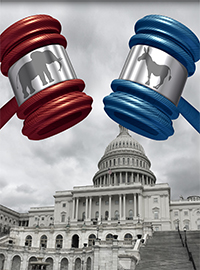| Familiarity Breeds Contempt: Trust in Government Falls to 20% in Pew Survey |
 |
|
By Timothy H. Lee
Thursday, June 09 2022 |
The bigger government gets, the more it micromanages our lives, the more Americans distrust it. File this under “Familiarity Breeds Contempt.” After six decades of relentless federal government expansion, according to the left-leaning Pew Research Center’s latest periodic survey, only 20% of Americans now express trust in government: Americans remain deeply distrustful of and dissatisfied with their government. Just 20% say they trust the government in Washington to do the right thing just about always or most of the time… Trust in government has remained at roughly this low level for more than a decade. Since the 2007-2008 financial crisis, no more than about a quarter of Americans have expressed trust in the federal government to do what is right all or most of the time… Asked about some descriptions of the federal government, relatively small shares of Americans say they think of the federal government as responsive to the needs of ordinary Americans, being careful with taxpayer money, or being able to address new problems as they come up. No more than one-in-ten say each of these phrases describe the federal government very or extremely well, and less than half say they describe the federal government even “somewhat” well. Majorities say these are not too, or not at all, good descriptors of the federal government. Note that timeline. A pronounced and enduring slump in trust commenced in the wake of the 2007-2008 financial crisis, which the Obama Administration leveraged to amplify the size and scope of government in American life. Recall Rahm Emanuel’s infamous November 2008 admonition to “not let a crisis go to waste.” Socialized medicine, suffocating overregulation of internet service, higher taxes, creation of unaccountable new federal bureaucracies and even light bulb regulation drove confidence in government to basement levels from which it hasn’t recovered. In contrast, trust in government consistently remained at an elevated 75% range during the Eisenhower, Kennedy and early Johnson administrations before plummeting to 27% under Jimmy Carter. Public trust trended back upward toward the 50% level under Ronald Reagan, before collapsing to 19% under Bill Clinton. Trust rose again to 54% under George W. Bush in the aftermath of 9/11, but then collapsed to where it has stagnated since Obama commenced his all-out effort to expand the reach of government. In other words, Americans overwhelmingly trusted government when it did less and focused more on its core functions, but lost faith when it commenced its immense growth trajectory with LBJ’s “Great Society.” In not unrelated news this week, a headline announcing a new Politico/Morning Consult survey read, “Biden’s Approval Rating Sinks to New Low.” According to reports from inside the White House, Biden privately fumes that his approval rating trails his predecessor Donald Trump, so this release compounded his bad news: The latest survey found that 58% of voters disapprove of Biden’s job performance and 39% approve. It marks the 46th president’s lowest approval rating and highest disapproval rating in 62 weekly surveys conducted since he took office in January 2021. For comparison, Biden’s latest numbers are worse than Donald Trump’s were at this time four years ago, when 45% approved and 52% disapproved of the former president. The problem, and the correlation, are obvious. Biden stubbornly seeks to increase the size and scope of government power, made worse by his bumbling incompetence in executing it. From drug price controls to reimposing regulations over an internet sector that is performing just fine without it, from energy sector antagonism to student loan forgiveness, Biden’s insistence on enlarging a federal government that fewer and fewer Americans trust largely explains his own unpopularity. Ironically, a periodic Gallup survey reporting similarly low distrust of government identifies just three institutions in American life that continue to enjoy confidence levels exceeding 50%: small business, the military and police. Yet those are the three institutions that Biden and the political left target for regulation, neglect or outright hostility. These latest surveys of American sentiment lead to an inescapable takeaway: Smaller government tends to be better government, and more trusted government. A Biden Administration confronted with catastrophically sinking levels of approval might internalize that lesson to the extent it hopes to correct course. |
Related Articles : |
























